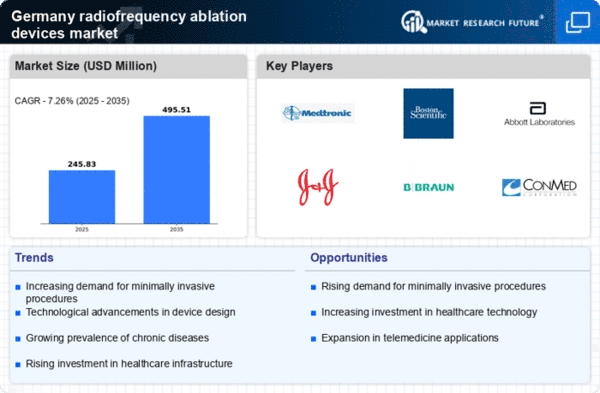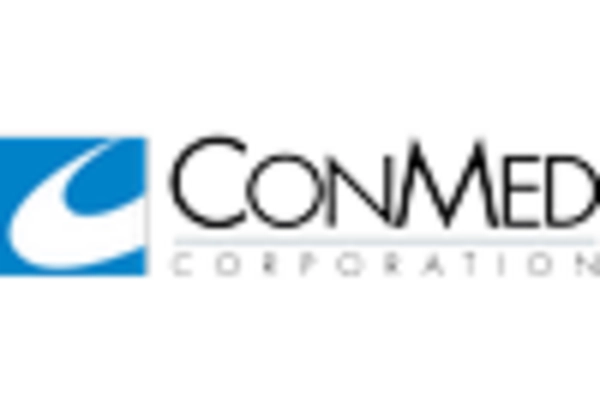Supportive Reimbursement Policies
Supportive reimbursement policies in Germany are playing a crucial role in the expansion of the radiofrequency ablation-devices market. The German healthcare system, characterized by its comprehensive insurance coverage, facilitates access to innovative medical treatments. Reimbursement for radiofrequency ablation procedures is increasingly being recognized, which encourages healthcare providers to adopt these technologies. As a result, patients are more likely to receive timely and effective treatments, leading to improved health outcomes. The German Federal Joint Committee (G-BA) has been instrumental in evaluating and approving new medical technologies, ensuring that effective treatments are accessible to the population. This supportive regulatory environment is expected to enhance the adoption of radiofrequency ablation devices, thereby driving market growth. With the increasing recognition of the cost-effectiveness of these procedures, the radiofrequency ablation-devices market is poised for significant expansion in the coming years.
Rising Prevalence of Chronic Diseases
The increasing incidence of chronic diseases in Germany is a pivotal driver for the radiofrequency ablation-devices market. Conditions such as cancer, cardiac arrhythmias, and chronic pain are becoming more prevalent, necessitating effective treatment options. According to health statistics, chronic diseases account for approximately 70% of all deaths in Germany, highlighting the urgent need for advanced medical interventions. Radiofrequency ablation offers a minimally invasive solution, which aligns with the growing demand for effective and less invasive treatment modalities. As healthcare providers seek to improve patient outcomes, the adoption of radiofrequency ablation devices is likely to rise, thereby propelling market growth. Furthermore, the aging population in Germany, which is projected to reach 23 million individuals aged 65 and older by 2030, further emphasizes the need for innovative treatment options, making this driver particularly significant for the radiofrequency ablation-devices market.
Expansion of Healthcare Infrastructure
The expansion of healthcare infrastructure in Germany is a significant driver for the radiofrequency ablation-devices market. Investments in healthcare facilities, particularly in urban areas, are enhancing access to advanced medical technologies. The German government has been actively promoting the modernization of healthcare services, which includes the integration of state-of-the-art medical devices. As hospitals and clinics upgrade their facilities, the adoption of radiofrequency ablation devices is likely to increase. Additionally, the establishment of specialized centers for chronic disease management is creating a conducive environment for the implementation of these technologies. With the healthcare expenditure in Germany projected to reach €500 billion by 2025, the focus on improving healthcare delivery systems is expected to bolster the radiofrequency ablation-devices market. This expansion not only improves patient access to innovative treatments but also enhances the overall quality of care.
Growing Awareness and Patient Education
Growing awareness and patient education regarding treatment options are vital drivers for the radiofrequency ablation-devices market. As patients become more informed about their health conditions and available treatments, there is a noticeable shift towards seeking minimally invasive procedures. Educational campaigns by healthcare providers and patient advocacy groups are instrumental in disseminating information about the benefits of radiofrequency ablation. This increased awareness is likely to lead to higher patient demand for these procedures, as individuals seek alternatives to traditional surgical options. Furthermore, the rise of digital health platforms and telemedicine is facilitating access to information, empowering patients to make informed decisions about their healthcare. As a result, the radiofrequency ablation-devices market is expected to experience growth driven by this heightened patient engagement and demand for innovative treatment solutions.
Technological Innovations in Medical Devices
Technological advancements in medical devices are significantly influencing the radiofrequency ablation-devices market. Innovations such as improved electrode designs, enhanced imaging techniques, and real-time monitoring systems are enhancing the efficacy and safety of ablation procedures. For instance, the integration of 3D mapping systems allows for more precise targeting of tissues, reducing the risk of complications. The market for medical devices in Germany is expected to grow at a CAGR of around 5% over the next few years, driven by these technological improvements. As healthcare providers increasingly adopt these advanced technologies, the demand for radiofrequency ablation devices is likely to surge. This trend not only improves patient outcomes but also positions Germany as a leader in the development and application of cutting-edge medical technologies, thereby fostering growth in the radiofrequency ablation-devices market.

















